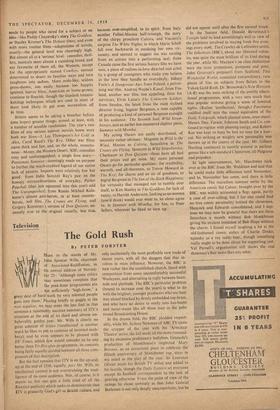Television
The Gold Rush
By PETER FORSTER HARK to the words of Mr. John Spencer Wills, chairman of Associated-Rediffusion, in his annual address of Novem- ber 25: 'Although some critics may sometimes 'complain that the peak-hour programmes are not sufficiently "high-brow," a great deal of hard work by very talented people goes into them.' Pausing briefly to goggle at the non sequitur, we may none the less find in that sentence a reasonably succinct summary of ITV's situation at the end of its third and almost un- believably golden year. Mr. Wills is clearly no great admirer of critics ('intellectual' is another word he likes to pet in commas of inverted snob- bery), and he even appears to be pleased with TV Times, which few would consider to be any better than Tit-Bits-plus-programmes, its contents being fairly equally divided between all three com- ponents of that description.
But the fact remains that ITV is on the up-and- up at the end of 1958; equally, pace Mr. Wills, its intellectual content is not overstraining the intel- ligence of its mass audience. Nor, of course, is it meant to, but one gets a little tired of all the frenzied publicity which seeks to demonstrate that ITV is primarily God's gift to British culture, and only incidentally the most profitable new trade of recent years, with all the dangers that that in- volves in mass influence. However, the BBC is now rather like the established church, faced with competition from some uncomfortably successful Wesleyans, and alternating in reply between beati- tude and platitude. The BBC's particular problem (bound to increase over the years) is what to do with the brighter, younger producers who see their way ahead blocked by firmly embedded top-brass, and who have no desire to ossify into has-beens and never-wases like all those men in the pubs round Broadcasting House.
In the drama field, the BBC plodded respect- ably, while Mr. Sydney Newman of ABC TV came the cropper of the year with his 'Armchair Theatre' series, the fall made all the more resound- ing by excessive preliminary ballyhoo. Granada's production of Monkhouse's neglected Mary Broome, as an occasional piece to celebrate the fiftieth anniversary of Manchester rep, stays in my mind as the play of the year. Sir Laurence Olivier made his British TV debut and added to his laurels, though the Daily Express set everyone except its football correspondent to the task of proving otherwise. From the point of view of the ratings he chose unwisely in that John Gabriel Borkman is not only deeply unsympathetic, but he did not appear until after the first natural break.
In the feature field, Donald Baverstock's Tonight held its lead astonishingly well in view of the problems involved in staying fresh five even- ings every week. The Crawley-de Lotbiniere series, The Inheritors (BBC), about our liberated colon- ies, was quite the most brilliant of its kind during the year, while Mr. Mayhew's on class distinction were the most pretentious, pompous and poor. John Grierson's potpourri from Scotland, This Wonderful World, contained extraordinary, rare pieces of film on subjects from Belsen to the Yukon Gold Rush. Dr. Bronowski's New Horizon (A-R) was the most striking of the overtly educa- tional programmes, with a very sure touch that was popular without giving a sense of lowered sights. (Rather 'intellectual,' though.) Panorama codified itself into the visual equivalent of the Daily Telegraph, which pleased some, even many. Messrs. Day, Farson, Johnson Smith and Co. con- tinued to register with pleasing energy, and Robert Kee was kept so busy he had no time for a hair- cut. No striking or weighty new personality was thrown up in the course of the year. Mr. Gilbert Harding continued to rumble around in parlour games like a sub-standard Chesterton, all Palgrave and prejudice.
In light entertainment, Mr. Maschwitz took over at the BBC from Mr. Waldman and said that he could make little difference until November, and lo, November has come, and there is little difference. The marathon summer series by the American comic Sid Caesar, brought over by the BBC, was widely accounted a flop; again, partly a case of over-selling, but I for one could find no true comic personality behind the cleverness. Hancock and Edwards consolidated, and I sup- pose we may now be grateful that there are three Saturdays a month without Bob Monkhouse giving his strident imitation of Bob Hope without the charm. I found myself laughing a lot at the old-fashioned comic antics of Charlie Drake, squeaky as a toy teddy-bear, though something really ought to be done about his supporting cast. Val Parnell's organisation still shows the real showman's flair more than any other.


























 Previous page
Previous page